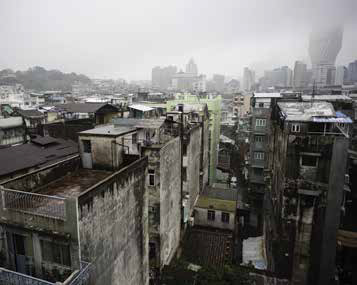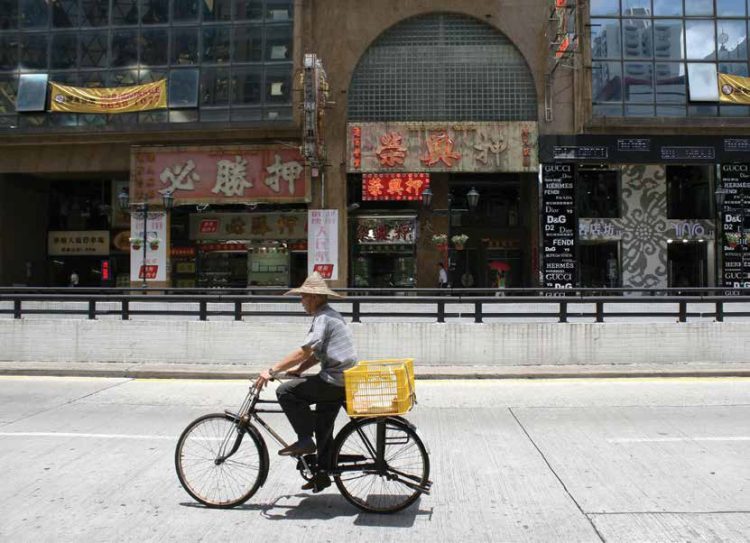Macau ranks as the sixth-wealthiest territory in the world as measured by GDP per capita. The trouble is, the spoils of the gaming boom are not being shared evenly among its population. Could this lead to a Hong Kong-style social meltdown?
Macau’s nominal GDP per capita in 2013 of US$91,376 placed it sixth on the World Bank’s list of all countries and dependencies ranked by that measure of national wealth. Macau’s figure has skyrocketed over the past decade on soaring casino receipts. Several problems have emerged as a consequence, chief among them the uneven distribution of the windfall from those receipts—unfortunately, per capita, in economics parlance, doesn’t mean equally shared, so some earn a lot less and others a lot, lot more. Macau’s median monthly salary stands at 13,000 patacas, or US$1,625. That means half of Macau’s workers earn less than $19,500 a year. You’d think mid-level workers in what’s pound for pound the world’s sixth-wealthiest territory would be taking home a lot more than that.
In 2002, at the official end of Stanley Ho’s 40-year casino operating monopoly in the city, Macau’s GDP per capita stood at US$15,779, and the median salary was 4,765 patacas per month, or $7,148 per year. The transformational casino development over the past dozen years has come with a 170% rise in the median wage, though that’s hardly kept up with the almost 480% increase in GDP per capita over the same period. As happens all too often, the rich get richer while the poor are ignored—until, as we’ve seen in Hong Kong, they finally take to the streets.
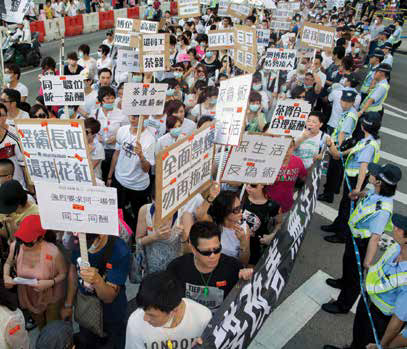
Pointedly, wage increases in Macau have fallen far short of soaring property prices. According to government statistics, in the second quarter of this year, the average price of residential units across Macau in the 50- to 99.9-square-meter size range was 104,913 patacas per square meter. The average price for the same size range in 2004 was 7,828 patacas. That represents a more than 13-fold jump. The government has built a limited stock of low-cost public housing, but demand far outstrips supply. Only a tiny minority of young Macau citizens were lucky enough to secure one of those units. Those who didn’t would be hard-pressed to come up with even the down payment on a 100-square-meter apartment, which at current prices costs a whopping 104.9 million patacas (US$13 million). For many of those young people, moving out and living independently from their parents is no longer an option.
So, beyond experiencing a fleeting sense of patriotic pride, what enthusiasm can the average Macau citizen rationally muster when he hears his city has overtaken Singapore to become Asia’s GDP per capita leader? With GDP per capita of $55,182 in 2013, Singapore took the 14th spot on the global list. But its wealth is better distributed among its populace, with median income (including employers’ central provident fund contributions on behalf of their employees) working out to $35,559 per annum. Further boosting the livability of the Lion City is the affordable, high-quality public housing provided by the Singapore Housing Development Board, which houses 80% of Singaporeans, some 90% of whom own the units they live in. Singapore’s Housing Development Board sprung from a far-sighted government policy introduced in 1964, dubbed The Home Ownership for the People Scheme, and it’s been credited with boosting the economic, social and political stability of the city-state.
Macau should take note, for while its gaming taxes have endowed it with bulging fiscal reserves capable of funding a far more extensive public housing program than it has pursued so far, it seems to lack the political will and leadership to follow through.
Macau people had long been regarded as politically apathetic, but that’s rapidly changing. Political activism has flared up in recent months—some refer to it as Macau’s political awakening— after the city witnessed on 25th May the largest protest since the 1999 handover, with citizens taking to the streets to voice their opposition to a lavish perks bill for outgoing government officials. Macau has also recently witnessed a spate of protests by casino workers demanding better pay and working conditions. In August, pro-democracy activists attempted to conduct an unofficial public referendum on the performance of Chief Executive Chui Sai On. The well-connected son of a construction and property magnate whose family goes back six generations in Macau, Mr Chui was about to be granted a second term by an elite committee of 400 similarly connected electors. Police quickly swept in to shut down the polling stations. Four organizers were arrested.
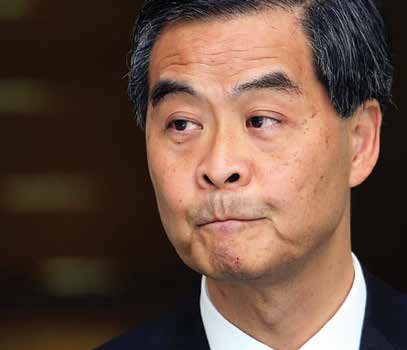
Many of the frustrations voiced by the massive Occupy Central movement in Hong Kong seem to resonate in Macau. The Hong Kong protestors were demanding full universal suffrage for the 2017 chief executive election. But their deeper grievances stem from problems created by the city’s widening wealth gap and the absence of legitimate political avenues to seek redress. For instance, many young married couples in Hong Kong are having to live separately because housing has become unaffordable—allegedly the result of collusion among the city’s powerful property cartel, made up of a small group of extraordinarily wealthy and politically connected developers intent on boosting their net worth by keeping house prices sky high.
The protesters simply don’t believe their concerns will be addressed if they continue to be represented by a Beijing-anointed guardian of the status quo A recent article in The Economist succinctly detailed the average Hong Konger’s mindset: “They [the student protesters] share grievances with many others in Hong Kong, including their worried parents, about inequality and about wealthy mainlanders buying up their property, filling prized spots in elite schools and taking the best jobs. Many fear the possible encroachment of the [Communist Party’s] authoritarian values on Hong Kong’s way of life.”
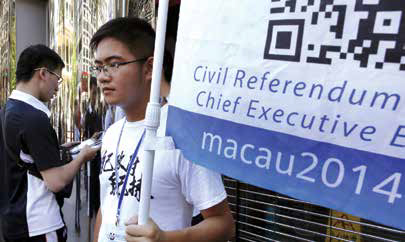
And, shockingly, in a recent interview with foreign media, Hong Kong Chief Executive Leung Cheung Ying made no bones about the government’s wish to limit the political representation of the poor and working class. Asked why only candidates selected by a 1,200-member Beijing-approved nominating committee could stand for the 2017 chief executive election, Mr Leung responded: “If it’s entirely a numbers game and numeric representation, then obviously you’d be talking to the half of the people in Hong Kong who earn less than US$1,800 a month.”
Hong Kong’s median income, which works out to $21,600 a year, is a smidgen more than in Macau. But since Hong Kong’s GDP per capita last year stood far below Macau’s, at $38,124, it would seem that wealth is arguably better distributed in Hong Kong. Therefore, if inequality was the spark that ignited Hong Kong’s Umbrella Revolution, there’s a good chance it could do the same in Macau.
